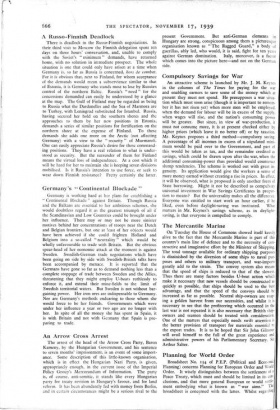Compulsory Savings for War
An attractive scheme is launched by Mr. J. M. Keynes in the columns of The Times for paying for the war and enabling earners to save some of the money which at present they must not spend. He presupposes a war situa- tion which must soon arise (though it is important to remem- ber it has not risen yet) when more men will be employed, when the demand for labour will be in excess of the supply, when wages will rise, and the nation's consuming power will be greater. But since, in, view of war-production, it must not consume more, it is at present checked either by higher prices (which leave it no better off) or by taxation. Mr. Keynes proposes a third method—compulsory saving. A percentage of all incomes in excess of a stipulated mini- mum would be paid over to the Government, and part of this would be taken as tax, and the remainder credited as savings, which could be drawn upon after the war, when the additional consuming-power thus provided would counteract slump tendencies. The scheme is worked out with great in- genuity. Its application would give the workers a sense of more money earned without creating a rise in prices. In effect, it will be observed, what is proposed is only another form of State borrowing. Might it not be described as compulsory universal investment in War Savings Certificates in propor- tion to means? But the universality makes all the difference. Everyone was entitled to start work an hour earlier, if he liked, even before daylight-saving was instituted. What matters in Mr. Keynes's savings scheme, as in daylight- saving, is that everyone is compelled to comply.




































































 Previous page
Previous page